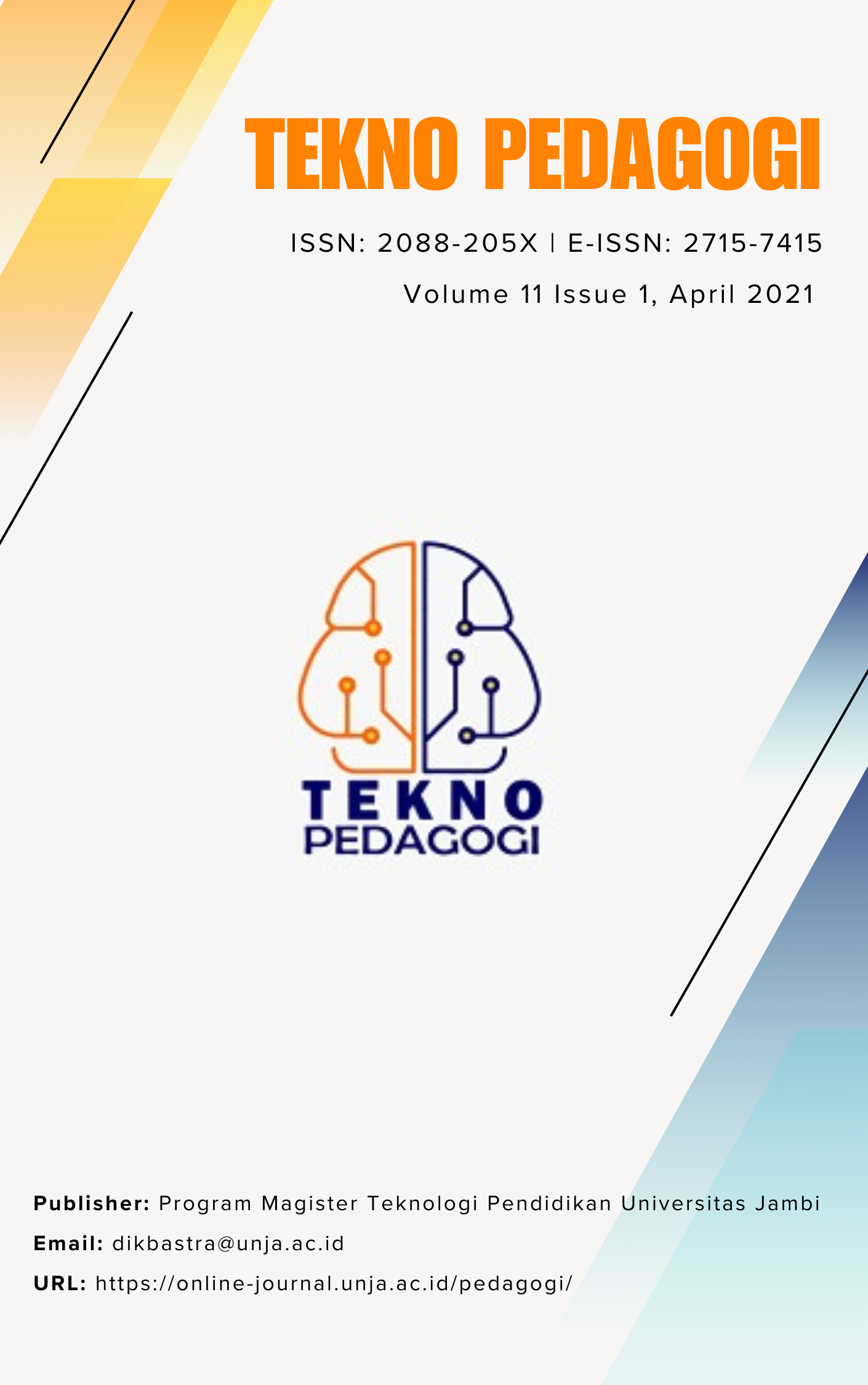Analysis of the Application of Observation in Thematic Learning in Class IV Elementary School
DOI:
https://doi.org/10.22437/teknopedagogi.v11i1.32708Keywords:
Analysis, Application, Thematic LearningAbstract
This study investigates the effect of implementing authentic assessment on student learning activities and outcomes in the context of elementary school history education. The research design involved an experimental approach, with one group receiving authentic assessment and another group receiving conventional assessment. Participants were fifth-grade students from a specific school. Data collection methods included pre-test and post-test assessments, observation of student activities during lessons, and a questionnaire to gauge student attitudes toward the learning process. The findings revealed that students who underwent authentic assessment demonstrated higher levels of engagement in learning activities compared to those subjected to conventional assessment. Additionally, significant improvements were observed in the learning outcomes of students in the authentic assessment group. This suggests that authentic assessment not only fosters greater student involvement in the learning process but also enhances their understanding and retention of the subject matter. These results underscore the importance of incorporating authentic assessment practices in educational settings to promote more meaningful and effective learning experiences for students.
Downloads
References
Anas, A., & Firmansyah, R. (2020). Deskripsi Sikap Siswa Terhadap Pelajaran IPA Berdasarkan Adopsi Sikap Siswa, Kesenangan belajar IPA, dan Ketertarikan Belajar IPA di SMPN 16 Kota Jambi. Integrated Science Education Journal, 1(3), 94–100. https://doi.org/10.37251/isej.v1i3.114
Ariyanto, M., Kristin, F., & Anugraheni, I. (2018). Penerapan Model Pembelajaran Problem Solving untuk Meningkatkan Kemampuan Berpikir Kritis dan Hasil Belajar Siswa. Jurnal Guru Kita, 2(3), 106–115. https://jurnal.unimed.ac.id/2012/index.php/jgkp/article/view/10392/9331
Benes, S., Boyd, K. M., Cucina, I., & Alperin, H. L. (2021). School-Based Health Education Research: Charting the Course for the Future. Research Quarterly for Exercise and Sport, 92(1), 111–126. https://doi.org/10.1080/02701367.2020.1712315
Cintia, N. I., Kristin, F., & Anugraheni, I. (2018). Penerapan Model Pembelajaran Discovery Learning Untuk Meningkatkan Kemampuan Berpikir Kreatif Dan Hasil Belajar Siswa. Perspektif Ilmu Pendidikan, 32(1), 67–75. https://doi.org/10.21009/pip.321.8
Debataraja, J. (2021). Analisis Keterlaksanaan Model Pembelajaran Kooperatif Tipe STAD dan Pengaruhnya Terhadap Hasil Belajar Siswa pada Materi Bilangan Kuantum dan Bentuk Orbital. Indonesian Journal of Education Research (IJoER), 2(4), 80–86. https://doi.org/10.37251/ijoer.v2i4.532
Dehkordi, M. R. (2017). The Educational Impact of Traditional Games the Role of Zurkhaneh Sport in Educating Children. International Journal of Science Culture and Sport, 5(24), 134–139. https://doi.org/10.14486/intjscs659
Fauzi, A. (2019). Inovasi Pembelajaran Aktif Melalui Penggunaan Strategi Reading Guidedan Mind Mapping Pada Mata Pelajaran Sejarah Kebudayaan Islam Di Madrasah Aliyah. Didaktika: Jurnal Kependidikan, 13(2), 131–145. https://doi.org/10.30863/didaktika.v13i2.952
Hawa, S., & Yosef, Y. (2019). Aplikasi Metode Scamper Dalam Pengembangan Desain Pembelajaran Matematika Di Sekolah Dasar. Jurnal Pendidikan Matematika, 13(2), 143–152. https://doi.org/10.22342/jpm.13.2.6749.143-152
Hidayat, A. N. (2021). Program Bimbingan Belajar BTA-PPI dalam Meningkatkan Sikap Religius Siswa. Jurnal Pendidikan Agama Islam Indonesia (JPAII), 2(1), 1–5. https://doi.org/10.37251/jpaii.v2i1.587
Ho, L., & Devi, I. P. (2020). Students ’ Understanding of Interest in Learning Science. Integrated Science Education Journal (ISEJ), 1(2), 60–64. https://doi.org/10.37251/isej.v1i2.72
Khairah, R. (2020). Penggunaan Media Maket Terhadap Keaktifan Belajar Sejarah Materi Masa Kehidupan Pra-Aksara Siswa. Journal of Social Knowledge Education (JSKE), 1(4), 104–110. https://doi.org/10.37251/jske.v1i4.369
Ma`arif, M. A., & Rofiq, M. H. (2018). POLA PENGEMBANGAN KURIKULUM PENDIDIKAN PESANTREN BERKARAKTER: Studi Pondok Pesantren Nurul Ummah Mojokerto. TADRIS: Jurnal Pendidikan Islam, 13(1), 1. https://doi.org/10.19105/tjpi.v13i1.1635
Mieghem, A. Van, Struyf, E., & Verschueren, K. (2020). The relevance of sources of support for teachers’ self-efficacy beliefs towards students with special educational needs. European Journal of Special Needs Education, 00(00), 1–15. https://doi.org/10.1080/08856257.2020.1829866
Novalia, M. (2020). Pengaruh Model Kepemimpinan terhadap Kesejahteraan dan Produktivitas Kerja Karyawan dalam Perspektif Ekonomi Islam. Journal of Social Knowledge Education (JSKE), 1(4), 115–119. https://doi.org/10.37251/jske.v1i4.378
Oktaviani, N. R. (2020). Dampak Implementasi Full Day School Dalam Pelaksanaan Pembelajaran Di Sekolah Dasar. Journal of Basic Education Research, 1(1), 07–15. https://doi.org/10.37251/jber.v1i1.30
Pratiwi, M. R., Ramadhanti, A., Setyarini, E. F., Kholila, K., & Fitriani, R. (2021). Analisis Pendidikan Karakter “Motivasi” Belajar Siswa Kelas X SMAN 1 Kota Jambi. Schrödinger: Journal of Physics Education, 2(1), 1–6. https://doi.org/10.37251/sjpe.v2i1.450
Salmawati, & Oktavia, W. D. (2022). Analisis Motivasi Belajar Siswa pada Pelajaran Fisika Kelas XI IPA di SMA Negeri 6 Kota Jambi. Schrödinger:Journal of Physics Education, 3(3), 47–51. https://doi.org/10.37251/sjpe.v3i3.500
Setiawan, A. R. (2019). Pembelajaran Tematik Berorientasi Literasi Saintifik. Jurnal Basicedu, 4(1), 51–69. https://doi.org/10.31004/basicedu.v4i1.298
Suciyati, S., & Masrita, M. (2020). Kemampuan Siswa Pendidikan Anak Usia Dini Dalam Mengenal Bilangan. Journal of Basic Education Research, 1(1), 36–40. https://doi.org/10.37251/jber.v1i1.35
Sukarni, W. (2021). Modifikasi Sistem Sosial Model Pembelajaran Problem Solving Untuk Meningkatkan Sikap Sosial Siswa. Journal Evaluation in Education (JEE), 2(2), 63–72. https://doi.org/10.37251/jee.v2i2.154
Suryawati, E., & Osman, K. (2018). Contextual learning: Innovative approach towards the development of students’ scientific attitude and natural science performance. Eurasia Journal of Mathematics, Science and Technology Education, 14(1), 61–76. https://doi.org/10.12973/ejmste/79329
Wahyuni, S. (2021). Pengaruh Metode Kodaly terhadap Kecerdasan Musikal Anak Usia Dini. Indonesian Journal of Education Research (IJoER), 2(1), 23–17. https://doi.org/10.37251/ijoer.v2i1.519
Widiyatiningsih, A. P. (2021). Strategi Pembelajaran Pendidikan Agama Islam di Sekolah Dasar. Jurnal Pendidikan Agama Islam Indonesia (JPAII), 2(1), 10–12. https://doi.org/10.37251/jpaii.v2i1.589
Yulisot, T. S., Lumbantoruan, J., & Marzam. (2017). Penerapan Kurikulum 2013 Dalam Mata Pelajaran Seni Budaya Di SMP Negeri 2 Payakumbuh. E-Journal Sendratasik UNP, 6(1), 41–45.
Zesra, Z. (2020). Pengembangan media pembelajaran berbasis Adobe Flash dalam kompetensi geometri 3D. Journal Evaluation in Education (JEE), 1(2), 50–53. https://doi.org/10.37251/jee.v1i2.46
Downloads
Published
How to Cite
Issue
Section
License
Copyright (c) 2021 Nopitasari Nopitasari

This work is licensed under a Creative Commons Attribution 4.0 International License.


















